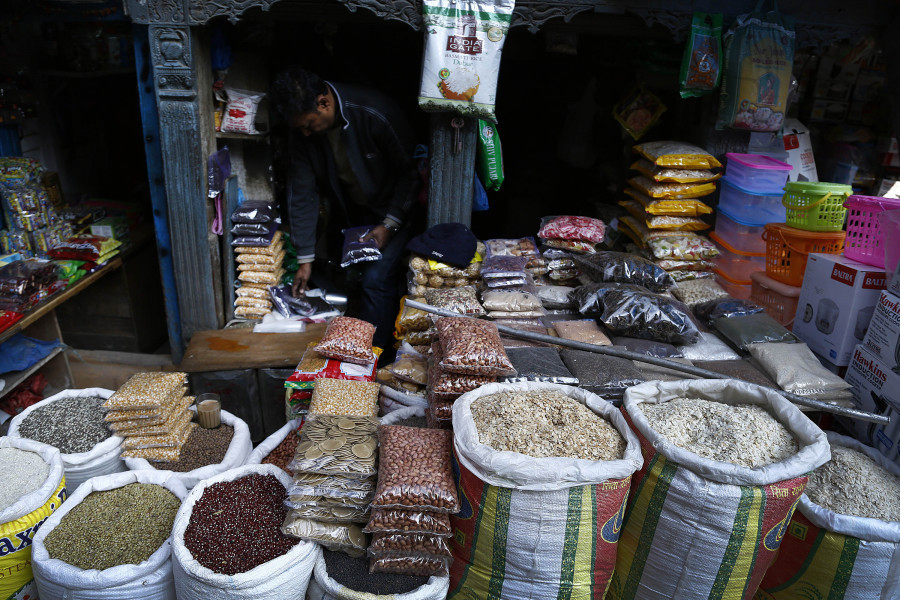Money
Retailers urge the government to probe rising food prices
Essential goods have become costlier in the past few days despite sufficient stocks and regular supply.
Krishana Prasain
Retailers have urged the government to probe rising food prices as essential goods have become costlier in the past few days despite sufficient stocks and regular supply.
They said dearer gasoline may have contributed to the price rise besides concerns over possible supply chain disruptions due to the lockdowns in various Indian states.
“The private sector holds an inventory of essential food items enough for up to six months as shipments are regular. So there is no reason for the price hike in the market. It might have been caused by fuel prices that have been rising continuously in recent times. The Department of Commerce, Supplies and Consumer Protection should conduct an inspection and find out the truth,” Raj Kumar Shrestha, president of the Nepal Retailers Association, told the Post.
Shrestha said that the price of a bag of rice surged by Rs50 in the past few days. Lentils and legumes have become dearer by Rs5-7 per kg, and sugar now costs Rs4-5 more per kg.
"As the Indian government has imposed restrictions on movement and lockdowns in different states to control the spread of the virus, many fear that this might impact the supply chain and cause hardships in Nepal," said Shrestha.
“The government is aware of the price hike amid an uncertain situation, and there will be no restrictions on shipments of essential food items,” said Narayan Regmi, joint secretary at the Ministry of Industry, Commerce and Supplies. He added that there was no problem in supply and that it was regular.
The Department of Commerce, Supplies and Consumer Protections, however, seems to be unaware that food prices have gone up of late.
“We are currently inspecting the vegetable market and chicken stores,” said Prakash Poudel, director general of the department. "The department only checks that the prices customers are charged match the listed prices, and that goods past their expiration dates are not sold."
According to the food supply situation report of the Ministry of Industry, Commerce and Supplies as of April 13, there are 10,332 tonnes of rice, 145,215.38 tonnes of salt, 75,156 tonnes of sugar, and 760.87 quintals of wheat stored in warehouses.
Food Management and Trading Company has issued a tender to procure 50,000 quintals of rice from the market, and has started the process to purchase 30,000 quintals of wheat at the minimum support price fixed by the government.
The company's rural depots hold 32,845.22 quintals of rice.
The ministry said that it was trying to speed up its market inspection so that shortages are not created and prices are not jacked up under some pretext.
Shrestha said that wholesalers have blamed higher prices at the source for food becoming costlier. The government should provide information about market prices by conducting inspections effectively, he added.
Nepal imports most of its food requirement, mainly from India. According to the Trade and Export Promotion Centre, the country imported cereals worth Rs54.69 billion in the first eight months of the current fiscal year, a sharp rise of 47.8 percent year-on-year. During the same period in fiscal 2019-20, cereals valued at Rs37 billion entered the country.
Archana Prajapati of Sukedhara used to buy groceries every week, but terrified by reports of rising infections amid the second wave of Covid-19, she has bought a month's supply of groceries.
“Going to grocery stores is full of risk in recent times, so I purchased essential items at once so that they will last at least for a month,” said the 49-year-old housewife.
Considering the uncertain situation with daily spikes in Covid-19 cases in the Kathmandu Valley, and the government placing restrictions on different public places, and urging people to stay home and not go out unless absolutely necessary, people are stockpiling essential goods, retailers said.
"There is no panic buying, but in the past few days people have started buying more than they need immediately," said Sabindra Beyanjankar, sales manager at the Tripureshwor outlet of Bhat Bhateni Supermarket.
According to the Ministry of Health and Population, Nepal had recorded 2,449 new cases and 110 antigen positives as of Friday. The overall infection tally has reached 294,601 with 14,724 active cases.
The Kathmandu Valley recorded 940 new infections in the past 24 hours. Of them, 760 cases were confirmed in Kathmandu, 106 in Lalitpur and 74 in Bhaktapur.
Nepal Rastra Bank figures show that consumer price inflation stood at 3.02 percent in the first eight months of the current fiscal year 2020-21, compared to 6.70 percent during the same period in the last fiscal year.
The price of ghee and oil increased by 19.97 percent year-on-year while the price of fruits rose by 13.67 percent, tobacco products by 10.41 percent and pulses and legumes by 10.17 percent. The wholesale price of consumption goods increased by 8.45 percent in the review month.




 15.12°C Kathmandu
15.12°C Kathmandu














